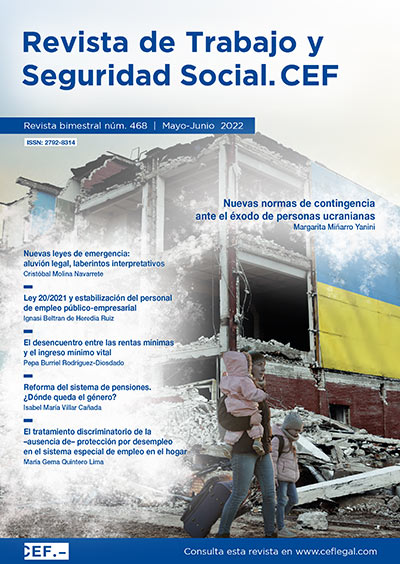The mismatch between the minimum income of the autonomous communities and the minimum vital income: decreasing protection and confusing regulation
DOI:
https://doi.org/10.51302/rtss.2022.4061Keywords:
minimum vital income, minimum income of the autonomous communities, false complementarity, European Social Charter, poverty, temporary benefit, active employment policiesAbstract
The entry into the scene of the minimum vital income (IMV) through Royal Decree-Law 20/2020, of May 29, meant the appearance of a state social benefit to cover the risk of poverty and social exclusion; but, it is also aimed at covering other new risks related to job insecurity or the so-called "technological unemployment", as indicated by statement of the motives of the law. Also, the purpose of the rule was to provide a certain heterogeneity to the protection of these risks that was carried out, at least, through the minimum income of the autonomous communities. But the IMV has acted like a tsunami in the protection provided in these, by not taking into account the existing regulatory diversities; the IMV has caused modifications in the autonomic regulations that entail a reduction in the sphere of protection and social spending, when they are necessary due to the figures of poverty and social exclusion in our country. The analysis of this text will cover some of the most significant aspects of the autonomous benefits versus the state benefit, emphasizing the most pronounced problems, both past and present, and in a classic forgetfulness in this matter, that is, the obligatory nature of the compliance with the European Social Charter.
Downloads
References
Burriel Rodríguez-Diosdado, P. (2020). Las obligaciones de las personas beneficiarias del ingreso mínimo vital: las infracciones y sanciones previstas y su posible incidencia en la coordinación de prestaciones de la Seguridad Social a nivel europeo. e-Revista Internacional de la Protección Social, 5(2), 94-114. https://doi.org/10.12795/e-RIPS.2020.i02.06
Burriel Rodríguez-Diosdado, P. (2021a). La renta garantizada de la ciudadanía en Cataluña y el ingreso mínimo vital: una nueva «pareja de hecho» condenada a entenderse. En I. M. Villar Cañada y F. Vila Tierno (Dirs.), Renta mínima y democracia sustantiva: de los «derechos de pobreza» a los de «ciudadanía social». Universidad de Jaén.
Burriel Rodríguez-Diosdado, P. (2021b). Problemas externos e internos del ingreso mínimo vital. Jurisdicción Social. Revista de la Comisión de lo Social de Juezas y Jueces para la Democracia, 224. http://www.juecesdemocracia.es/wp-content/uploads/2021/07/Revista-Social-Julio-n%C2%BA224.pdf
Jimena Quesada, L. (2020). El derecho a la protección contra la pobreza y la exclusión social como paradigma del respeto de la dignidad humana. La inserción del ingreso mínimo vital en el marco de la evolución de los estándares internacionales. Lex Social, 10(2), 361-423. https://doi.org/10.46661/lexsocial.5073
Laparra Navarro, M. (15 de mayo de 2020). Complementariedad o desmantelamiento de las rentas mínimas autonómicas. Agenda Pública. El País. https://agendapublica.elpais.com/noticia/17038/complementariedad-desmantelamiento-rentas-minimas-autonomicas
Sánchez-Rodas Navarro, C. (2020). La lucha contra la exclusión socio-laboral en España: 1990-2020. e-Revista Internacional de la Protección Social, 5(1), 5-14. https://doi.org/10.12795/e-RIPS.2020.i01.01
Sanzo González, L. (2019). Las rentas mínimas en España. VIII Informe FOESSA. Documento de trabajo 6.2. https://www.foessa.es/main-files/uploads/sites/16/2019/05/6.2.pdf



















